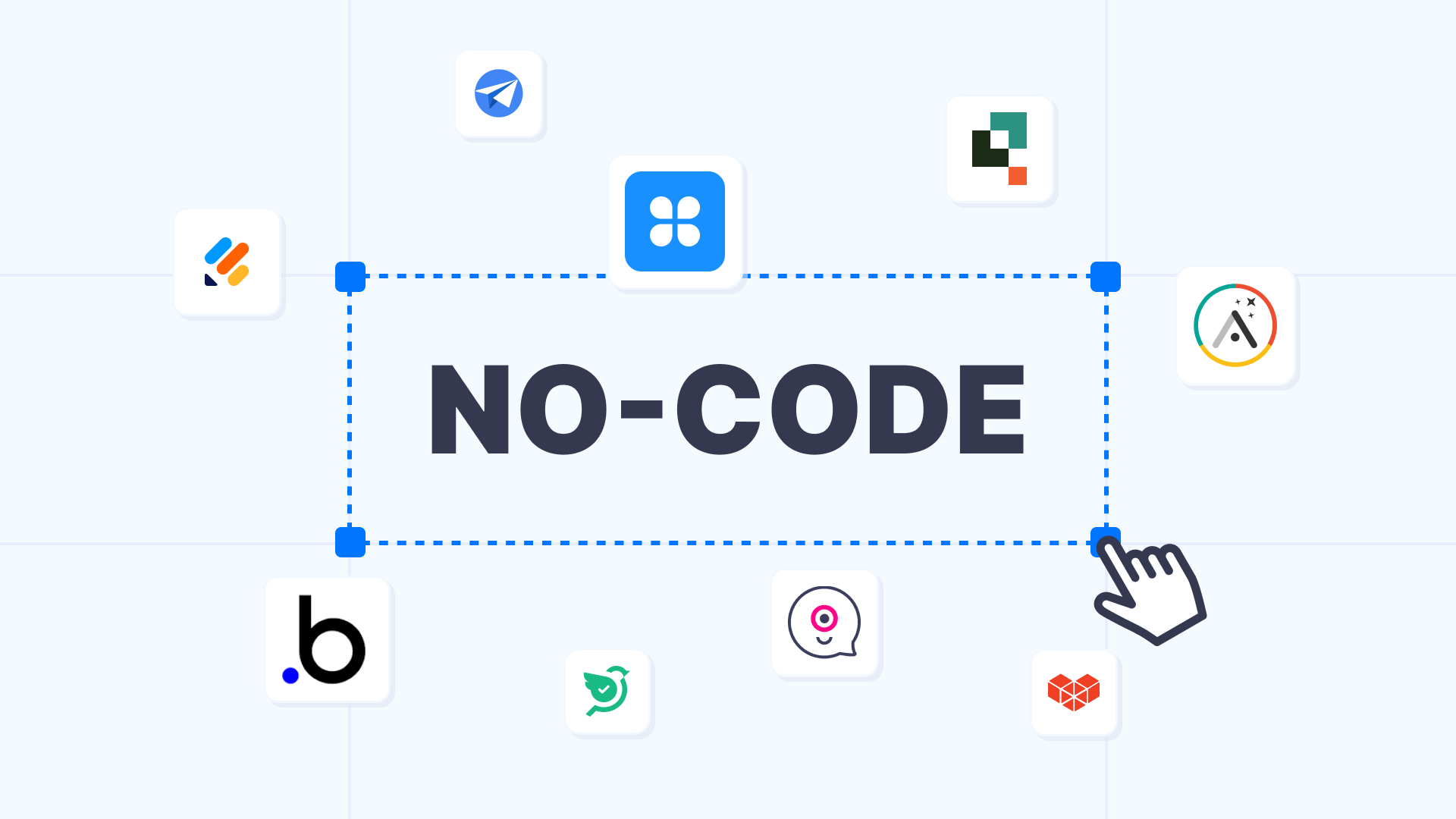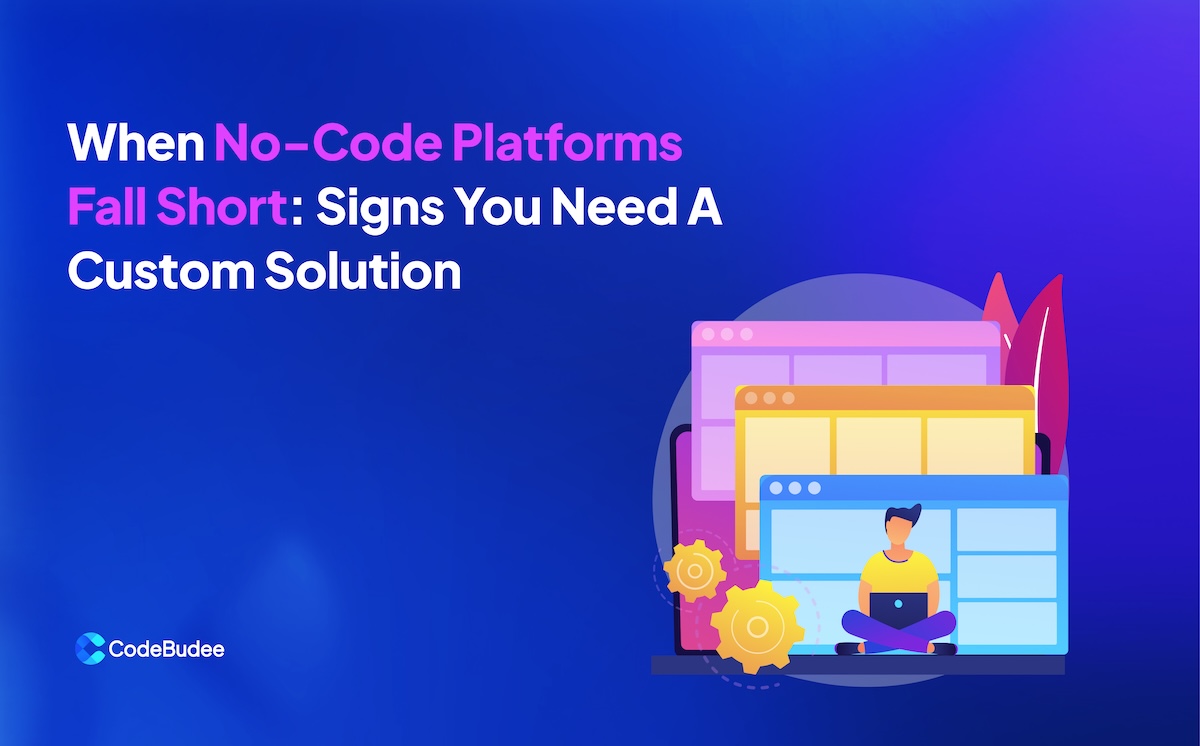No-code solutions have had all the hype for a few years and for all the right reasons. They help you develop mobile and web apps or software quickly and pave the way for better team collaboration. Despite these benefits, no-code solutions have some challenges.
They aren't scalable and customizable, and they cannot handle complex workflows that limit your business growth in the long run. That's why many businesses opt for custom software development to build software and apps that align with their unique needs.
Let's discuss the cons of no-code solutions and how investing in a custom-built system can take your business on the road to success!
Challenges of No-Code Solutions

The following are the challenges of no-code solutions that help you understand why it's not the right choice for your business:
1. Limited Flexibility
One of the major challenges of no-code solutions is their limited flexibility and customization. You use pre-built components and workflows, which make it quite difficult to transfer data and implement custom logic when necessary.
Not only this, but this lack of control over the underlying code also restricts your ability to customize applications and websites as per end-user needs, lowering customer satisfaction.
For instance, if your business requires a unique checkout process or advanced automation, no-code solutions may not support that workflow. Or you may want to integrate a third-party solution on your website to enhance customer convenience but cannot due to rigid templates.
2. No Scalability
No-code solutions are indeed good when you are just starting your business and need to manage day-to-day operations. However, as your business grows, these platforms fail to accommodate your increasing needs.
It's because they are good at handling simple workflows but struggle to keep up with complex functionalities and large data volumes. This leads to multiple issues and potential bottlenecks.
Let's say you have developed a customer management platform using a no-code solution. In the initial days, when the traffic is limited to only a few hundred users, the app performs as expected, with smooth customer interactions and incredible sales opportunities.
But as your user base increases to thousands or millions, the app starts to slow down and even crash in some instances, leaving customers frustrated.
3. Accumulation of Tech Debt
To make matters worse, no-code solutions also add significant tech debt to your business, leading to slow innovation and low-quality products. Typically, tech debt refers to the accumulated cost or consequences that you incur when you take shortcuts or rely on suboptimal designs during software or application development. On average, technical debt accounts for 20% to 40% of the entire technology estate.
But how do no-code platforms contribute to this? Well, firstly, these solutions lack modularisation as they are monolithic entities with intertwined components and dependencies. This makes it quite difficult to isolate a specific component and fix it in case of an issue, hence increasing overall complexity.
In addition, they often lack the version control feature, hindering developers' collaboration with others and rollback to other versions when needed. Developers cannot see the issues detected, modifications they made, or even revert to the previous state. Data inconsistencies and the lack of chance to refactor the application are all reasons for technical debt.
4. Security Concerns
Do you know that in 2025, around 45% of global organizations are going to be hit by cyber crimes? These cyber attacks severely hit the business's reputation and also resulted in huge financial losses. Statistics show that the average cost of cybercrime is predicted to hit over $23 trillion in 2027.
Unfortunately, one of the challenges of using no-code solutions for your web or mobile applications is that they don't protect you from security vulnerabilities. Yes, it's true! While the no-code platform itself is safe, you may find it difficult to ensure whether the application built on a no-code platform is PCI DSS-compliant.
Then, you are unable to check the changes you made at a granular level, which can further exacerbate security concerns. All this is a nightmare for your business if it is responsible for handling sensitive customer information, such as financial details, that hackers can manipulate for personal gains.
5. Vendor Lock-In
With no-code solutions, you actually don't have access to the source code. This implies that if you ever need to migrate your application to another platform, you'll not be able to do so.
The end result? You'll either need to continue developing solutions for different needs on the same platform or switch to another one and create an app from scratch.
It may seem easy to read, but actually putting it into action is time-consuming and expensive, draining your business finances and lowering the team's morale.
6. Learning Curve
No-code solutions make it easy for you to create software and applications quickly. Nonetheless, they have multiple components and logic that require extensive learning, something that team members with little technical knowledge may not figure out. The end product then has an unorganized or convoluted interface, impacting users' experience.
Why Do You Need Custom Development Solutions?

Statistics show that today, over 85% of businesses utilize custom software solutions to optimize their operations.
Let's discuss some other reasons to invest in custom software development services:
1. Personalization
One of the biggest advantages of custom software development is that it offers personalization. Unlike canned software dedicated to the general audience, customized web or mobile solutions are created to handle the unique needs of your business and target customers.
Developers work with you from the start to understand the challenges you face and your future goals. Based on this data, they came up with software that offers exclusive advantages and makes you stand out in the crowded market.
Let's say you want an application that can offer your customers a personalized shopping experience. With a no-code solution, you might be limited to generic templates, which leave no room for tailoring the app. However, with custom software solutions, you can integrate AI technologies that offer personalized recommendations, enhancing customer satisfaction.
2. Cost-Effective
You may think traditional low-code or no-code solutions are cost-effective, but that's not true. These platforms cost little initially, but over time, you have to spend a lot of money to scale and maintain them.
In some cases, scaling isn't an option, so you end up creating another app from scratch, which exhausts your business expenses. Gladly, that's not the case with custom software development.
Custom web and mobile applications have all the necessary features you need and are created within your budget. You don't have to pay additional money to get advanced features, and the maintenance costs are also very low, which saves you money.
3. High Security
To win the trust of your end customers, you have to guarantee them that your application complies with all privacy regulations. They don't have to worry about their personal details being victims of cyber-attacks and have the much-needed peace of mind.
That's where custom software development helps you!
These software are designed according to the latest security standards and adhere to GDPR. The cherry on the cake is that they undergo rigorous testing, which ensures that your critical business data isn't at risk of intrusions or attacks.
4. Quick Maintenance
Another reason to opt for custom software rather than no-code solutions is that you get access to continuous support and maintenance.
For instance, if you face an issue like your application crashing frequently or the version is outdated, you can immediately get in touch with the development team.
They provide efficient technical support and make necessary tweaks, resolving all issues. As a result, you can make the most of your investment and enjoy up-to-date software.
The best part is that you have access to the source code for easy refactoring and can integrate third-party apps, including multiple payment gateways, without any complexity.
FAQs
1. How much does custom software development cost?
The cost of custom software development starts from as low as RM 30,000 and can go sky-high depending on the features you need.
2. What's the duration of custom software development?
Custom software development can take 4 to 9 months, including everything from planning to completion and testing.
3. Can custom software handle your growing business needs?
Yes, custom software can easily handle your growing needs. It has incredible flexibility and can be redesigned to expand your business without compromising functionality.
Conclusion
No-code solutions may seem convenient, but they are neither reliable nor scalable. That's why it's better to opt for custom software development. If you are unable to find a credible software development partner for your business, CodeBudee has your back.
We work closely with you to understand your unique needs and create custom solutions that cater to them. All our software undergoes rigorous testing, so you or your clients don't have to worry about any security vulnerabilities.
So get in touch with us today and enjoy highly secure, scalable, and budget-friendly apps that help you make a lasting digital impact.


